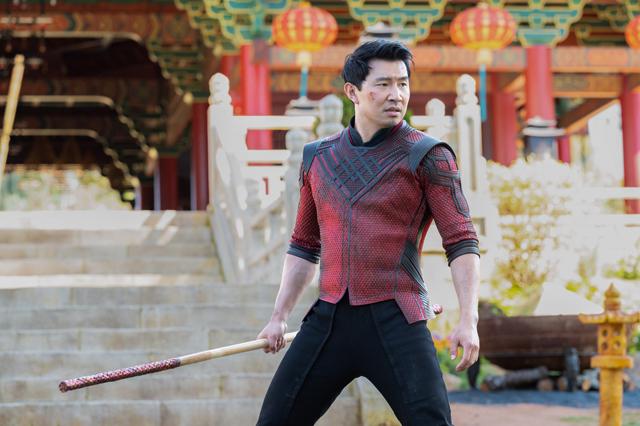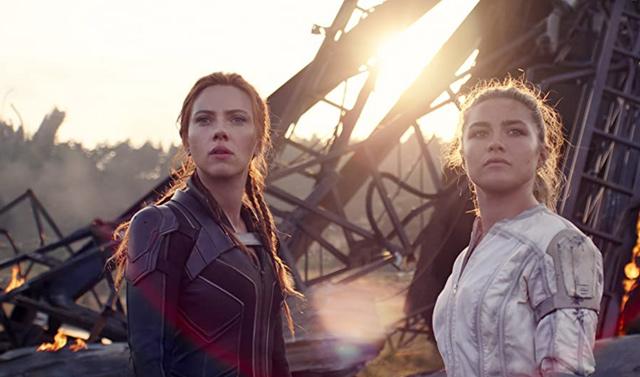You are here
Marvel eyes China with ‘Shang-Chi and the Legend of the Ten Rings’
By AFP - Sep 07,2021 - Last updated at Sep 07,2021

Simu Liu in ‘Shang-Chi and the Legend of the Ten Rings’ (Photo courtesy of imdb.com)
LOS ANGELES — In Hollywood’s latest attempt to score in the huge — but highly restrictive — Chinese market, an Asian actor has been cast as a leading Marvel superhero for the first time.
“Shang-Chi and the Legend of the Ten Rings” takes the 25th instalment in the wildly popular Marvel film series into mythical China, where enormous beasts, mysticism and kung fu collide for a tale about the difficult relationship between a son and his father.
The titular son — played by relatively unknown Chinese-Canadian actor Simu Liu — fled his controlling dad as a teenager, after being sculpted into a deadly assassin, and washes up in the United States.
There he lives anonymously, palling around with the underachieving Katy, played by Awkwafina (“Crazy Rich Asians”), until his father — Hong Kong superstar Tony Leung — sends a sinister gang to chase him home.
“Shang-Chi” locates itself firmly in the record-grossing Marvel Cinematic Universe series of movies, with an amusing reprisal of Ben Kingsley’s washed-up actor Trevor Slattery from “Iron Man 3.”
Its value for Marvel Studios, and owner Disney, however, was expected to be as a vehicle for expanding into the Chinese market.
“It’s very moving because it’s been a long time coming to have an Asian superhero, and a movie that celebrates not only our culture but our humanity,” Asian-American actress Jodi Long told AFP at the film’s world premiere in Los Angeles.
“And I think that’s really important in this time of Covid and xenophobia.”
‘Stereotype’
Yet, despite a predominantly Asian cast, and huge swathes of dialogue in Mandarin — both predicted to be popular among China’s cinemagoers — success for “Shang-Chi” is far from guaranteed.
Like the previous Marvel film “Black Widow”, the film still doesn’t have a release date in China, where movie theatres reopening this summer are stocked largely with domestic, patriotic features.
As well as protecting Chinese filmmaking, this could reflect growing discontent with Disney-owned Marvel, whose next big superhero outing “Eternals” is being directed by Beijing-born Chloe Zhao.
Zhao won two Oscars including an historic best director statuette this year for “Nomadland”, but her success has been censored in China after a nationalist backlash over years-old interviews in which she appeared to criticise her country of birth.
Excitement in China for “Shang-Chi” also appears to be lukewarm among some social media users.
“This movie will only deepen the world’s stereotype of us,” wrote one user on Weibo, China’s Twitter-like messaging service.
“Marvel may not want to insult China, but it is a fact that in terms of casting, it has to cater to the American social aesthetic of humiliating China.”
Another user called it “a poor attempt to mint money from Chinese audiences”.
On popular review site Duoban — similar to Rotten Tomatoes — one user bemoaned the notion of an Americanised Chinese man returning to his homeland to do battle with his traditionally minded father.
“Marvel do you really want to enter China with such a plot?” the user wrote.
‘Multi-dimensional’
Marvel Studios president Kevin Feige, in a recent interview with a Chinese film journalist, sought to tamp down that criticism, insisting the narrative is actually one of Shang-Chi returning to his roots.
“That sense of running away... is presented as one of his flaws,” he said, according to Variety.
Director Destin Daniel Cretton told AFP that filmmakers had worked hard to overcome “some very clear stereotypes that were created in life and society, and that were also part of the original comics.”
“So for me the most important thing to get right in this movie were the characters — that they are relatable, that they are multi-dimensional, whether they are the hero Shang-Chi or whether they are the quote-unquote villain.”
Box office
The North American box office got a big boost as Disney’s new “Shang-Chi and the Legend of the Ten Rings”, featuring Marvel’s first leading Asian superhero, scored an unexpectedly strong $71.4 million opening, industry observer Exhibitor Relations reported Sunday.
That figure, for the Friday-through-Sunday period, was a Labour Day weekend record, the Hollywood Reporter said, and the film is expected to take in an additional $12.1 million on Monday.
“This is a fantastic opening on a traditionally quiet Labour Day weekend,” said David A. Gross of Franchise Entertainment Research. “The three-day number is a record-breaker for the holiday, a positive finish to the summer... [marking] a sensational weekend for the industry.”
The film, which has drawn strong reviews for its choreography and Asian representation, enjoyed the second biggest opening of this pandemic year, behind Marvel’s “Black Widow”, which had an $80 million opening.
By way of comparison, Universal’s slasher film “Candyman” topped last weekend’s box office with just $22 million before slipping to second place this weekend with a three-day take of $10.6 million ($13 million for four days). It stars Yahya Abdul-Mateen II.
In third place this weekend was “Free Guy” from 20th Century, at $8.7 million ($11.2 million for four days). The sci-fi comedy stars Ryan Reynolds as an everyman bank teller who finds himself inside a huge video game.
Paramount animation “PAW Patrol: The Movie” came in fourth, at $4 million ($5.2 million for four days). It tells the story of a boy and the brave young pups who help him save their city from an impeachment-worthy mayor.
And in fifth was Disney’s family adventure film “Jungle Cruise,” with a take of $3.95 million ($5.2 million for four days).
Rounding out the top 10 were “Don’t Breathe 2” ($2.2 million for three days; $2.7 million for four), “Respect” ($1.2 million; $1.5 million), “The Suicide Squad” ($905,000; $1.1 million), “Black Widow” ($748,000; $903,000) and “The Night House” ($552,000; $700,000).
Related Articles
When that big-screen break — involuntarily extended by the COVID-19 pandemic — finally ended with the release of “Black Widow”, Hollywood will be watching closely to see if Marvel still has its mojo.
LOS ANGELES — “Venom: Let There Be Carnage”, Sony’s latest instalment in its Spider-Man Universe, debuted to pre-pandemic levels atop
LOS ANGELES — New sci-fi thriller “Dune”, a classic that almost demanded big-screen treatment, topped the North American box office this wee












